新概念英语2第三课-课件PPT
新概念英语第二册第三课(精校版)
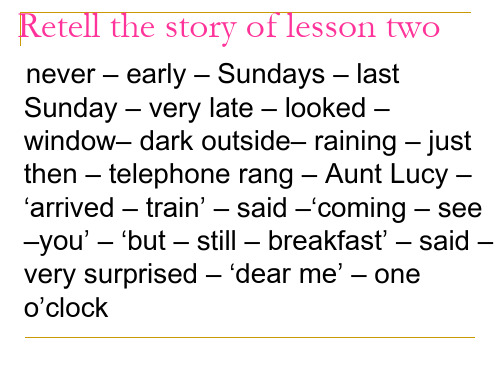
I visited museums and sat in public gardens. A friendly waiter taught me a few words of Italian. teach sb. sth. 教某人某事 王老师上学期教我们语文 Miss Wang taught us Chinese last term. He teaches our English.
★spoil(spoiled,spoilt) ① vt. 弄坏,损坏,糟蹋 这不幸的消息使我们没能过好周末。 The sad news spoiled our weekend. 这场雨把学校运动会弄得一团糟。 The rain spoiled the school sports meeting. This spoiled my day. What you said spoiled me. His arrival spoiled my holiday.
Lesson 3 Please send me a card!
Pictures of Rome
Crazy for ancient culture?
“All roads lead to Rome!”
Crazy for fashion?
Go to Milan!!!
Crazy for water and carnival?
ቤተ መጻሕፍቲ ባይዱ
★lend v. 借给 (借出) lend sth. to sb/lend sb. sth. 你能把你的自行车借给我吗? Can you lend me your bike? Can you lend me ¥20 please? I’ll pay/give it back tomorrow. borrow (借进):borrow sth. from sb./borrow sth. (borrow不能用 borrow sb. sth.) 他昨天借了我的笔。 He borrowed my pen yesterday. I lent him my pen yesterday. = I lent my pen to him yesterday.
新概念英语第二册第三课(包含课文及完整课后练习)
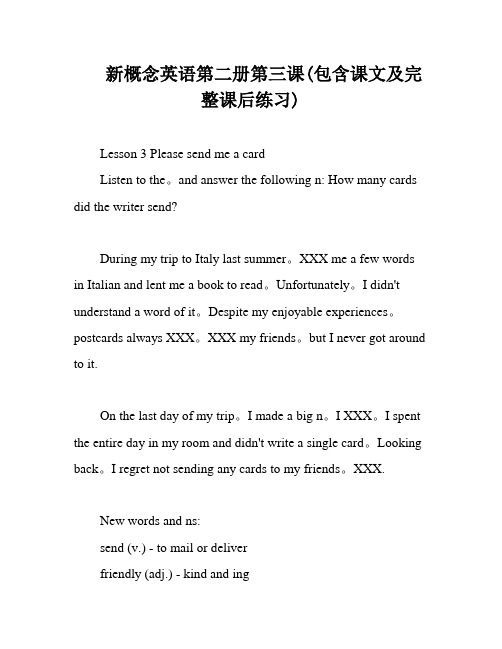
新概念英语第二册第三课(包含课文及完整课后练习)Lesson 3 Please send me a cardListen to the。
and answer the following n: How many cards did the writer send?During my trip to Italy last summer。
XXX me a few words in Italian and lent me a book to read。
Unfortunately。
I didn't understand a word of it。
Despite my enjoyable experiences。
postcards always XXX。
XXX my friends。
but I never got around to it.On the last day of my trip。
I made a big n。
I XXX。
I spent the entire day in my room and didn't write a single card。
Looking back。
I regret not sending any cards to my friends。
XXX.New words and ns:send (v.) - to mail or deliverfriendly (adj.) - kind and ingpostcard (n.) - a card for sending a message by mailwaiter (n.) - a person who XXXspoil (v.) - to ruin or damagelend (v.) - to give something to someone for a short d of timemuseum (n.) - a place where objects of historical。
新概念英语第二册课PPT课件演示文稿

2)当主句的谓语动词是将来时的时候, 如: He will say, “I’ll try my best to help you.”
——>He will say that he will try his best to help me.
第二十二页,共36页。
1)时间状语:
直接引语 (间接引语)
now (then);
today (that day);
tomorrow (the next / following day ) next week (the next / following week)
yesterday (the day before)
football after school.” ——> He said that when he was a child, he usually played football after school. 5)当直接引语是客观真理或自然现象时,
第二十页,共36页。
如: Our teacher said to us, “Light travels faster than sound.” ——> Our teacher told us that light travels faster than sound. 6)当引语是谚语、格言时, 如: He said,“Practice makes perfect.” ——>He said that practice makes perfect. 7)当直接引语中有情态动词should, would, could, had
作为一名护士,你应该对病人十分耐心。
新概念英语第二册lesson-3
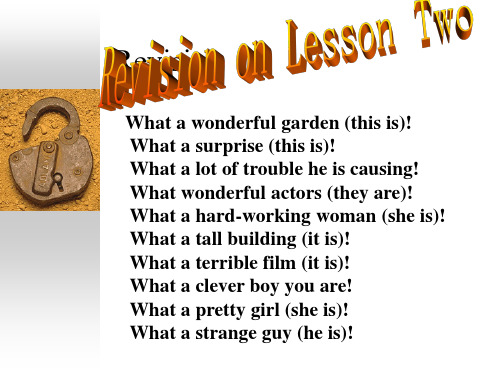
以上三个是指物理上的破坏, 而spoil主要指精神 上
Lend (lent) (lent ) v. 借出
lend sth.to sb=lend sb.sth. Can you lend 50 yuan to me? lend me your ears. 请听过我说。
public house简称pub : 酒吧 ; public place 公共场所. public lavatory ['lævətɔri】 公厕
in public:公开的; in private:私下里的 Let’s have a conversation in private. 让我们私下谈谈? Why not has a conversation in public? 为什么不公开谈呢?(当面说呢?)
Pair discussion!
Now, imagine you are having a trip overseas. And you only have 1, only 1, postcard. Who do you want to send to?
Now, everyone have 3 minutes to tell your partner. Let’s begin!
Germany German
Ireland Irish
Brazil
Brazilian
America American
Greece Greek
Canada Canadian
Australia Australian
新概念英语第二册第三课(包含课文及完整课后练习)

Lesson 3 Please send me a card 请给我寄一张明信片First listen and then answer the question.听录音,然后回答以下问题。
How many cards did the writer sendPostcards always spoil my holidays. Last summer, I went to Italy. I visited museums and sat in public gardens. A friendly waiter taught me a few words of Italian. Then he lent me a book. I read a few lines, but I did not understand a word. Everyday I thought about postcards. My holidays passed quickly, but I did not send cards to my friends. On the last day I made a big decision. I got up early and bought thirty-seven cards.I spent the whole day in my room, but I did not write a single card!New words and expressions 生词和短语send v. 寄,送friendly adj. 友好的postcard n. 明信片waiter n. 服务员,招待员spoil v. 使索然无味,损坏lend v. 借给museum n. 博物馆decision n. 决定public adj. 公共的single adj. 唯一的,单一的whole adj. 整个的Note on the text 课文注释1 a few words,几句话。
新概念英语第二册第三课课文详解
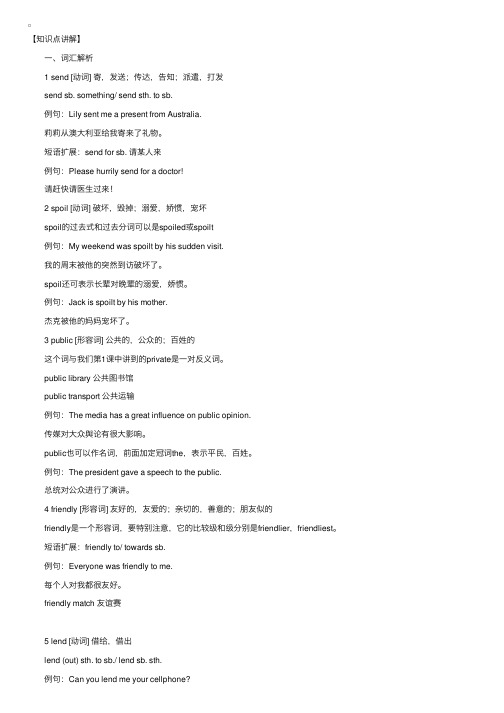
【知识点讲解】 ⼀、词汇解析 1 send [动词] 寄,发送;传达,告知;派遣,打发 send sb. something/ send sth. to sb. 例句:Lily sent me a present from Australia. 莉莉从澳⼤利亚给我寄来了礼物。
短语扩展:send for sb. 请某⼈来 例句:Please hurrily send for a doctor! 请赶快请医⽣过来! 2 spoil [动词] 破坏,毁掉;溺爱,娇惯,宠坏 spoil的过去式和过去分词可以是spoiled或spoilt 例句:My weekend was spoilt by his sudden visit. 我的周末被他的突然到访破坏了。
spoil还可表⽰长辈对晚辈的溺爱,娇惯。
例句:Jack is spoilt by his mother. 杰克被他的妈妈宠坏了。
3 public [形容词] 公共的,公众的;百姓的 这个词与我们第1课中讲到的private是⼀对反义词。
public library 公共图书馆 public transport 公共运输 例句:The media has a great influence on public opinion. 传媒对⼤众舆论有很⼤影响。
public也可以作名词,前⾯加定冠词the,表⽰平民,百姓。
例句:The president gave a speech to the public. 总统对公众进⾏了演讲。
4 friendly [形容词] 友好的,友爱的;亲切的,善意的;朋友似的 friendly是⼀个形容词,要特别注意,它的⽐较级和级分别是friendlier,friendliest。
短语扩展:friendly to/ towards sb. 例句:Everyone was friendly to me. 每个⼈对我都很友好。
新概念英语第二册第三课PPT
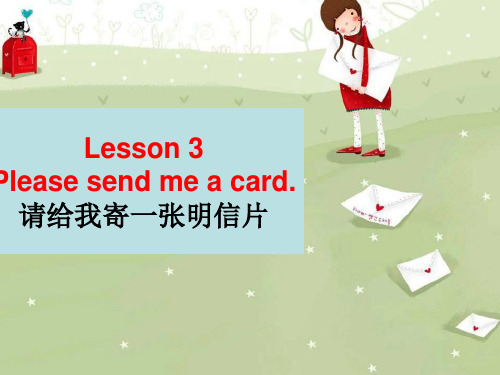
Summary Writing
1. Postcards always spoil the winter’s holiday. 2. He spent his holidays in Italy last summer. 3. He thought about postcards every day. 4. He didn’t send any cards to his friends. 5. He bought 37 cards on the last day. 6. He stayed in his room all day. 7. He didn’t write any cards.
直接宾语表示动作结果动作所涉及的事物和间接宾语动作目标动作是谁做的或为谁做的通常是人动作目标动作是谁做的或为谁做的通常是人
Lesson 3 Please send me a card. 请给我寄一张明信片
Lesson 3 Please send me a card
Learning objectives: • Be able to listen and comprehend the text • Be able to make sentences with the new • words and phrases • Be able to retell and do summary writing • Be able to use the direct objects and indirect • objectsres
一般过去时 一般过去时通常表示过去发生的而现在已经结束的事件、动作或情况。它通常 指动作何时发生,而不指动作持续多久。 Do you ever catch a cold in the winter? Yes, I caught a cold last winter.
新概念第二册 PPT 课件

旅游英语
将课程内容与旅游场景相 结合,教授学生在旅游过 程中如何运用英语进行沟 通和表达。
课程实践活动的组织与实施
小组讨论
组织学生进行小组讨论,培养学 生的团队协作和沟通能力,提高 学生的口语表达和听力理解能力
。
角色扮演
组织学生进行角色扮演活动,模拟 真实场景中的对话和交流,培养学 生的口语表达和听力理解能力。
倒装句。
03
课程实践与应用
听说读写各项技能训练
听力训练
通过播放英语音频材料,训练 学生的英语听力理解能力,提 高语音识别和信息捕捉能力。
口语训练
通过模拟真实场景的对话练习 ,培养学生的英语口语表达能 力,增强自信心和沟通技巧。
阅读训练
通过阅读英文文章和短篇小说 ,提高学生的阅读理解能力和 词汇量,培养阅读兴趣和习惯 。
03
和英语能力,以便更好地引导学生学习。
如何根据学生需求选择合适的教材
了解学生需求
在选择教材之前,教师应了解学生的 学习目标、英语水平、兴趣爱好等,
以便选择最适合学生的教材。
考虑学生的实际生活经验和背景,选 择更贴近学生需求的教材。
比较不同教材的特点
教师应对各种教材进行比较,了解其 特点、难度、教学方法等,以便为学 生选择最适合的教材。
教学内容:都涵盖了语法、词汇、阅读、听力等语言学习的各个方面。
与其他教材的异同点分析
• 教学方法:都采用了多种教学方法,如任务型教学、情景 教学等。
与其他教材的异同点分析
01
不同点
02
教材内容:新概念第二册与其他教材在内容上有所不同,新概念第二 册更注重实际应用,话题更贴近生活。
03
难度:新概念第二册的难度相对于其他教材略高,语法点和词汇量更 大。
新概念2第三课知识点
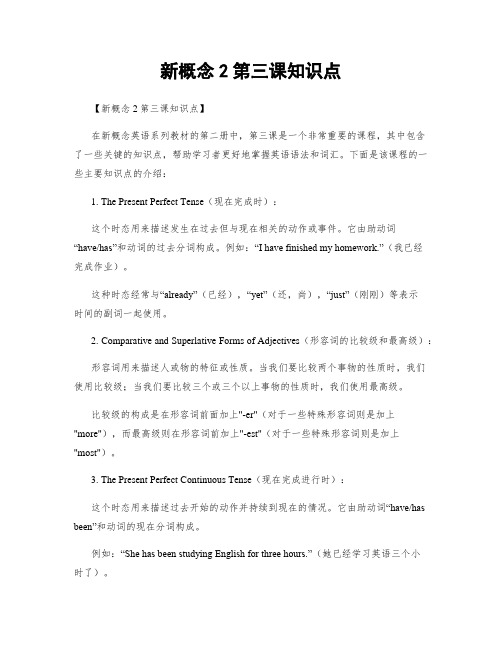
新概念2第三课知识点【新概念2第三课知识点】在新概念英语系列教材的第二册中,第三课是一个非常重要的课程,其中包含了一些关键的知识点,帮助学习者更好地掌握英语语法和词汇。
下面是该课程的一些主要知识点的介绍:1. The Present Perfect Tense(现在完成时):这个时态用来描述发生在过去但与现在相关的动作或事件。
它由助动词“have/has”和动词的过去分词构成。
例如:“I have finished my homework.”(我已经完成作业)。
这种时态经常与“already”(已经),“yet”(还,尚),“just”(刚刚)等表示时间的副词一起使用。
2. Comparative and Superlative Forms of Adjectives(形容词的比较级和最高级):形容词用来描述人或物的特征或性质。
当我们要比较两个事物的性质时,我们使用比较级;当我们要比较三个或三个以上事物的性质时,我们使用最高级。
比较级的构成是在形容词前面加上"-er"(对于一些特殊形容词则是加上"more"),而最高级则在形容词前加上"-est"(对于一些特殊形容词则是加上"most")。
3. The Present Perfect Continuous Tense(现在完成进行时):这个时态用来描述过去开始的动作并持续到现在的情况。
它由助动词“have/has been”和动词的现在分词构成。
例如:“She has been studying English for three hours.”(她已经学习英语三个小时了)。
这个时态通常与表示时间段的短语一起使用,比如“for three hours”(三个小时)或“since last night”(从昨晚开始)。
4. Prepositions of Time(表示时间的介词):介词用来在句子中表达时间、位置或方向等关系。
何尔喜精讲新概念英语第二册(第3课)

Spoil spoiled or spoilt 使索然无味 损坏
• • • • • • • • 几种破坏 : break: 打破; break the windows/record/your arm 侧重于将一个整体打破成不完整的碎片或者部分。 damage: 破坏, 程度不一定很重. Smoking can damage your health. destroy : 破坏, 彻底摧毁 以上三个是指物理上的破坏, 而spoil主要指精神上 spoil: 把东西的质量变得不好; 生活中不顺心的事;宠 坏, 溺爱
v. 借出
• 借出 lend to / lend sth.to sb/ lend sb.sth. • Can you lend 50 dollars to me?
• 借进 borrow: borrow from; • 但borrow不能用 borrow sb sth. • I borrowed an interesting book from the library.
根据中文说出相应的英文
1、忍受 2、无礼地,粗鲁地 3、直到 4、外面 5、(铃、电话等)响 6、姑,姨 7、 重复 8、私人的 9、 谈话 10、 座位 11、 去剧院 12、大声交谈 13、 变得生气 14、 注意我 15、 转身 16、乘火车 17、 躺在床上 18、 向窗外看 19、不管你的事 20、 多黑的一天呀!
• spend+时间+地点 : 在什么地点我花费/度过了多 少时间 • I spend three hours in the sea. • I spend a lot of time in traffic jam. • spend还有什么用法,和哪些词进行比较?
新概念英语第二册 第三课
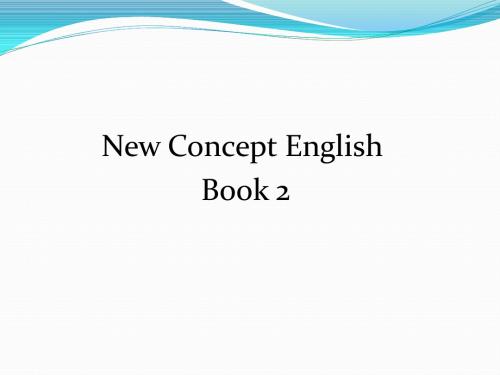
4、teach me a few words = teach a few words to me 双 宾语结构。a few words 几句话。 例句: I’d like to say a few words on the topic. Can I have a few words with you? (×) 吵架啦! Can I have a word with you? (√) 说句话而已。
2.实义动词的一般过去时态 肯定句要使用动词的过去式,否定句和疑问句 要使用助动词 do 和 does 的过去式 did. a.肯定句式:主语 + 动词(过去式)+ 其它 b.否定句式:主语 + didn’t + 动词(原形)+ 其 它 c.一般疑问句:Did + 主语+ 动词(原形)+ 其它
3. 情态动词的一般过去时态 a.肯定句式:主语 + 情态动词 + 其它. b. 否定句式:主语 + 情态动词 + not + 其它. c.一般疑问句:情态动词 + 主语 + 其它 例句: I could finish the work in an hour.
7、I did not understand a word. 我一个字也看不懂。 8、think about sth./sb. 想着 例句:I’m always thinking about you. 9、send cards to my friends = send my friends cards 双 宾语结构。 送出(take 和send)的区别: take 是某人亲自送;send 是通过第三人送
Answers: st summer, the writer spent his holiday in Italy. 2.His friends want him to send cards to them, he thought about the cards every day. 3. On the last day ,he decided to send cards to his friends, and he spent a whole day in his room.
新概念英语第二册第三课课件

掌握英语元音和辅音发音, 以及连读现象,提高口语 能力。
课程内容
日常生活表达
学习常见问候语及回答、道 歉及回答,以及表达喜欢和 不喜欢的表达方式。
虚拟语气
掌握虚拟语气的构成和用法, 包括用于假设、愿望和建议 等情况。
口语发音技巧
学习英语元音和辅音的正确 发音方式,以及连读现象的 应用技巧。
课程总结
新概念英语第二册第三课 课件
学会日常生活中常用的短语和表达方式,理解并使用虚拟语气,以及学习口 语发音技巧。提高英语听说读写综合能力,掌握英虚拟语气
3 口语发音技巧
掌握常用短语,包括问候、 道歉、以及表达喜欢和不 喜欢等。
学习运用虚拟语气来表达 假设、愿望和建议等情况。
1 复习课程内容
强化记忆,加深对课程内容的理解和掌握程度。
2 提高英语综合能力
通过听、说、读、写的综合训练,提高英语综合应用能力。
3 多多练习
鼓励学生多进行英语口语和写作的练习,逐步提升语言表达能力。
新概念英语第二册Lesson3课件
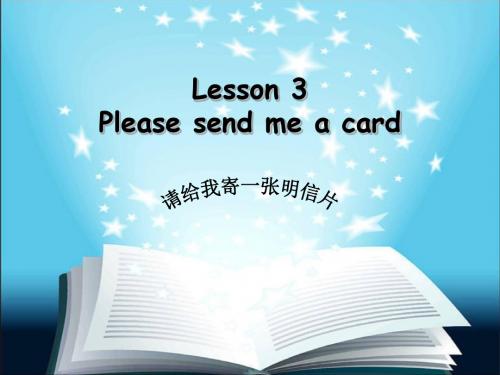
Explain the text
• 1)a little Italian:语言不可数,所以要用 a little Italian 或 a few words of Italian
• a little / little / a few / few 的区别: • a little / a few 都用肯定句,分别表示“有一点”和“有几
• v. 损坏,破坏 (主要指精神上) • 过去式,过去分词:spoiled or spoilt
Don't let him spoil your night The bad weather spoiled my mind • v. 宠坏,溺爱 He is a spoiled child. She spoiled her son by giving him too much money.
个”,但 a little 修饰不可数名 • 词;a few 修饰可数名词复数 • little / few 都用否定句,分别表示“没有多少”和“没有
几个”,但 little 修饰不可数名词; • few 修饰可数名词复数
2) teach sb.sth. = teach sth. to sb. lend sb. sth. = lend sth. to sb. send sth. to sb. = send sb. sth 双宾语 英语中许多动词带两个宾语,即直接宾语和间接宾语。 间接宾语通常是人,直接宾语通常是物。 例如:He lent me a book. = He lent a book to me. He bought me a book. = He bought a book for me. 间接宾语人在后面时,其前必须加间接宾语人在后面时,其
新概念第二册英语时态课件 (共29张PPT)
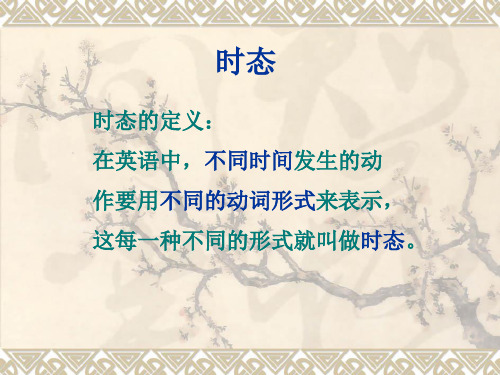
条件状语从句(if,unless, etc)
让步状语从句(though, although, etc)
1.一般现在时
3.表示永恒的真理,即使出现在过去的语境中,仍然用一般现 在时。
4. 在make sure (certain)=see to it, mind, care, matter + 宾
come true, consist of ,take place, happen, occur, break out, appear, arrive, die, fall, last, exist, fail, succeed, become, rise, 二、下列动词主动表被动,常与well, quite, easily, badly等连用
6、S+ was /were + being + pp….(过去进行时)
7、S+ has /have +been+ pp…. (现在完成时)
8、S+ had been + pp….
(过去完成时)
9、S+情态动词+ be+ pp….
(情态动词)
语态考点
一、不能用于被动语态的情况 所有不及物动词或不及物动词词组不用被动式:
❖ 表示状态存在的动词:be, exist, remain, stay, 等。 ❖ 表示占有或存属关系动词:have, own, belong, contain等。 ❖ 表示思考、理解等心理活动的动词:believe, doubt,
forget, know, remember, understand等。
- 1、下载文档前请自行甄别文档内容的完整性,平台不提供额外的编辑、内容补充、找答案等附加服务。
- 2、"仅部分预览"的文档,不可在线预览部分如存在完整性等问题,可反馈申请退款(可完整预览的文档不适用该条件!)。
- 3、如文档侵犯您的权益,请联系客服反馈,我们会尽快为您处理(人工客服工作时间:9:00-18:30)。
public ['pʌblik] a.公共的
single ['siŋgəl] a.唯一的,单一的
friendly ['frendli] a.友好的
• ★send v. 寄, 送
• send sth. to sb. /send sb. sth. 给某人送(寄)东西 • 类似结构:give sth to sb = give sb sth 给某人某物 • send/take children to school: • take强调某人亲自送; • send则是通过第三人去送, 如美国的校车 • take flowers to his wife 自己送 • send flowers to his wife 叫店里的人送
10
• Christmas card 圣诞贺卡
• Postman 邮递员 postoffice 邮局
11
• ★spoil(spoiled,spoilt) v. 使索然无味, 损坏
• ① vt. 弄坏,损坏,糟蹋 • The rain spoiled the school sports. • Our holidays were spoilt by bad weather.我们假日的乐趣被恶劣天气所破坏。 • ② vt. 宠坏,惯坏,溺爱 • Don’t spoil your children. 不能太惯孩子。 • Spare the rod and spoil the child. 孩子不打不成器。
13
• ★public adj. 公共的
• ① adj. 公共的,公众的,社会的
• There is a public library in this town.
• I always sit in public gardens on Sundays.
• ② adj. 公开的,众人皆知的
• Their secret meeting was made public 20 years later.
message in a bottle postcard letter email telephone qq/msn
text message mobile phone
• Today we will learn a story about postcard.
4
5
send [send] v.寄,送
• ③ n. 公众,群众,大众
• The public is/are pleased with his explanation.
• The museum is open to the public on Sunday.
14
• ★public place 公共场所
• 句型转换
• 1. Jason sent his mother a card. • 2. He gave me a story book. • 3. Can you lend me that book?
• 填空
• 1. She ____ a book to me last week. • 2. She ________ a book from the library yesterday. • 3. Don’t _______ money from me. I have no money with me. • 4. I will ______ you some money, but please return it to me soon.
• ★postcard n. 明信片
• 两个爆破音在一起,前者失去爆破音。这里/t/和/k/前者失去爆破音
• Related words: • name card 名片
Here is my name card. (口语常用, 同时伴随着递出的动作)
ID card 身份证 (ID 身份)
• credit card 信用卡 • cash card 现金卡储蓄卡工资卡(不能透支)
• break: 打破; break the windows 打破玻璃 • damage: 破坏, 程度不一定很重 • destroy : 破坏, 彻底摧毁
以上三个指物理上的破坏;spoil主要指精神上的
★museum n. 博物馆
• the Palace Museum 故宫博物院 • children's museum 儿童博物馆 • science museum 科学博物馆 • The British Museum 大英博物馆
• public house 酒吧,简称pub; public place 公共场所
• in public 公开的;in private 私下里的
• Let’s have a conversation in private.让我们私下谈谈?
• Why not have a conversation in public? 为什么不公开谈呢?(当面说呢?)
1
1.Do you like traveling? 2.Did you send postcards to 3.your friends when you traveled? 4.3. If you have a chance to choose,
5. Where will you go? 6. What will you do?
waiter ['weitə] n.服务员,招待员
postcard ['pəustkɑ:d] n.明信片 lend [lend] v.借给
spoil [spɔil] v.使索然无味,损坏 decision [di'siʒən] n.决定
museum[mju:'ziəm] n.博物馆 whole [həul] a.整个的• ★lend v. 借给
• lend to(借出): • lend sth. to sb = lend sb. sth.
• borrow from(借进): • borrow sth. from sb./borrow sth. (borrow不能用 borrow sb sth.) • He borrowed my pen yesterday.
